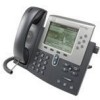Cisco 7962G Administration Guide - Page 63
Configuring Startup Network Settings - erase configuration
 |
UPC - 882658140341
View all Cisco 7962G manuals
Add to My Manuals
Save this manual to your list of manuals |
Page 63 highlights
Chapter 3 Setting Up the Cisco Unified IP Phone Configuring Startup Network Settings 3. Some or all of the line keys flash green. Normally, this sequence takes just a few seconds. However, if the phone's Flash memory is erased or the phone load is corrupted, the sequence of green flashes will continue while the phone begins a software update procedure. If the phone performs this procedure, the following buttons light to indicate progress: - Headset-Phone is waiting for the network and completing CDP and DHCP configuration. (A DHCP server must be available in your network.) - Mute-Phone is downloading images from the TFTP server. - Speaker-Phone is writing images to its Flash memory. 4. The LCD screen displays the Cisco Systems, Inc., logo screen. 5. These messages appear as the phone starts: - Verifying Load (if the phone load does not match the load on the TFTP server). If this message appears, the phone starts up again and repeats step 1 through step 4 above. - Configuring IP - Updating CTL - Updating Locale - Configuring CM List - Registering 6. The main LCD screen displays: - Current date and time - Primary directory number - Additional directory numbers and speed dial numbers, if configured - Softkeys If the phone successfully passes through these stages, it has started up properly. If the phone does not start up properly, see the "Resolving Startup Problems" section on page 9-2. Configuring Startup Network Settings If you are not using DHCP in your network, you must configure these network settings on the Cisco Unified IP Phone after installing the phone on the network: • IP address • IP subnet mask • Default gateway IP address • TFTP server IP address • You also may configure the domain name and the DNS server settings, if necessary. Collect this information and see the instructions in Chapter 4, "Configuring Settings on the Cisco Unified IP Phone." OL-14625-01 Cisco Unified IP Phone 7962G and 7942G Administration Guide for Cisco Unified Communications Manager 6.1 3-13















